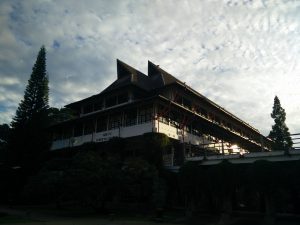Sekolah Farmasi ITB didirikan pada 6 Oktober 1947, dengan nama Departemen Farmasi, di bawah fakultas yang bernama Faculteit voor Wiskunde and Natuurwetenschapen. Saat itu, fakultas ini merupakan bagian dari Univertitas Indonesia. Pada tanggal 1 Februari 1949, fakultas ini diubah menjadi Fakultas Ilmu Pengetahuan dan Ilmu Alam (FIPIA), namun tetap berada di bawah Universitas Indonesia. Struktur organisasi Departemen Farmasi sangat sederhana, hanya satu orang yang bertanggung jawab untuk mengatur departemen, namun sejak 1959, organisasi berkembang dan seorang sekretaris diangkat untuk membantu ketua departemen.
 Pada tahun 1953 untuk pertama kalinya, warga negara Indonesia, Prof. dr. Rd Mhd Djuhana Wiradikarta, menjadi Dekan FIPIA, salah satu staf akademik di Departemen Farmasi, sampai tahun 1959. Pada tanggal 2 Maret 1959, Fakultas Teknik dan FIPIA digabung menjadi sebuah institusi baru, yaitu Institut Teknologi Bandung (ITB) dan Departemen Farmasi menjadi bagian dari Departemen Kimia dan Biologi sampai tahun 1961. Setelah perubahan organisasi pada tahun 1973, Departemen Farmasi menjadi bagian dari Fakultas Matematika dan Ilmu Pengetahuan Alam.
Pada tahun 1953 untuk pertama kalinya, warga negara Indonesia, Prof. dr. Rd Mhd Djuhana Wiradikarta, menjadi Dekan FIPIA, salah satu staf akademik di Departemen Farmasi, sampai tahun 1959. Pada tanggal 2 Maret 1959, Fakultas Teknik dan FIPIA digabung menjadi sebuah institusi baru, yaitu Institut Teknologi Bandung (ITB) dan Departemen Farmasi menjadi bagian dari Departemen Kimia dan Biologi sampai tahun 1961. Setelah perubahan organisasi pada tahun 1973, Departemen Farmasi menjadi bagian dari Fakultas Matematika dan Ilmu Pengetahuan Alam.
Hingga tahun 1987, Departemen Farmasi terdiri dari 5 bagian keilmuan, yaitu Kimia Farmasi, Formulasi, Biologi Farmasi, Farmakologi, dan Ilmu Dasar dan Ilmu Tambahan. Tiap-tiap bagian merupakan ilmu yang berhubungan, atau kelompok keilmuan dan terapan di bidang farmasi. Bagian-bagian ini meliputi teori, praktek, dan penelitian. Pada tiap bagian ada beberapa mata kuliah yang dibimbing oleh seorang staf sebagai kepala bagian yang bertanggungjawab untuk mengatur dan mengembangkan bagiannya dalam kuliah yang diberikan, praktek di laboratorium, dan mengatur proyek penelitian. Setiap laboratorium diatur dan diawasi oleh kepala laboratorium, dan setiap staf di departemen punya tanggung jawab masing-masing dalam memberikan kuliah, mendampingi praktikum, dan membimbing proyek penelitian mahasiswa. Organisasi akademik ini perlahan berkembang dan meningkat, dan sekarang sekolah mempunyai 5 Kelompok Keilmuan, yaitu Farmasetika, Farmakokimia, Farmakologi, Farmasi Klinik serta Biologi Farmasi dan Olahraga.
Di awal tahun 1947, mahasiswa yang diterima di Departemen Farmasi merupakan lulusan sekolah kelas B, seperti HBS, AMS, VHO atau sekolah menengah. Bahasa yang digunakan dalam perkuliahan adalah Bahasa Belanda dan Bahasa Inggris. Lama studi 5,5 tahun, terdiri dari 3 tahun tahap Sarjana Muda dan 2,5 tahun tahap Sarjana (S-1). Lulusannya mempunyai kesempatan untuk melanjutkan pendidikan lanjut (S-3) jika telah mengerjakan sedikitnya 1 subyek (mata kuliah) besar (hoofdvak) dan 2 subyek kecil (bijvak). Sebagai contoh, subyek besar adalah kimia, dan subyek kecil adalah botani, kehewanan, dan fisika. Kurikulum belum terstruktur dengan baik dan tidak ada batasan lama studi. Mulai tahun 1951, beberapa subyek telah ditambahkan ke dalam kurikulum sesuai dengan kebutuhan sistem pendidikan.
Karena keberadaan apoteker di Indonesia kurang memuaskan, pemerintah melalui Departemen Pendidikan Nasional RI mengeluarkan peraturan lama studi farmasi di perguruan tinggi, yaitu 4 tahun, yang terdiri dari 1 tahun tahap persiapan, 1 tahun pendidikan calon farmasis, dan 2 tahun pendidikan farmasi.
Pada tahun 1960, lama pendidikan farmasi berubah menjadi 6 tahun, yaitu 5 tahun pendidikan sarjana dan 1 tahun pendidikan profesi. Kurikulumnya diubah dan disesuaikan dengan kebutuhan sistem pendidikan. Beberapa mata kuliah baru dimasukkan ke dalam kurikulum, seperti Bahasa Inggris, Pendidikan Militer, Ilmu Resep, dan lain-lain.
Pada tahun 1973, ada perkembangan yang signifikan di ITB. Semua mahasiswa baru dimasukkan ke dalam Tahap Persiapan Bersama (TPB), mereka tidak dapat mendapatkan pendidikan di departemen manapun hingga mereka lulus TPB. Pada saat ini berlaku sistem kredit semester (SKS). Mahasiswa dapat memilih mata kuliah yang diinginkan dengan jumlah maksimum 24 SKS per semester. Sistem ini memudahkan mahasiswa untuk mengembangkan kemampuannya sendiri selama menyelesaikan pendidikan. Kemudian, kurikulum diubah setiap 5 tahun, disusun berdasarkan perkembangan ilmu pengetahuan dan teknologi di Indonesia. Kurikulum yang berlaku saat ini adalah kurikulum tahun 2013.
Selain Program Sarjana, sekarang Sekolah Farmasi menyediakan Program Magister dan Program Doktoral. Ada 8 jalur pilihan untuk Program Magister dan Doktoral, yaitu Farmasi Analisis, Kimia Medisinal, Teknologi Farmasi, Biofarmasi, Farmakognosi-Fitokimia, Farmakologi-Toksikologi, Analisis dan Keamanan Makanan, dan Farmasi Rumah Sakit. Sekolah farmasi juga membuka program pendidikan profesi yang bergelar apoteker dengan lama studi 1 tahun, pendidikan meliputi kuliah, kerja praktek profesi farmasi dan ujian komprehensif.
Pada tahun 1996, Departemen Farmasi ITB mempunyai kesempatan untuk mendapatkan tempat baru, yaitu Laboratorium Teknologi (Labtek) VII, di tengah ITB, di sebelah Gedung Teknik Elektro dan FMIPA. Dengan luas tanah 6579 m2, Departmen Farmasi ITB mengoptimalkan fasilitas dan bangunan untuk melayani mahasiswa dan stake holder. Banyak instrumen dan fasilitas modern diadakan, dan didukung oleh staf-staf berpengalaman. Semua ini membuat Departemen Farmasi ITB menjadi salah satu pendidikan farmasi terbaik di Indonesia.
Berdasarkan SK Rektor ITB No. 222/SK/1001/OT/2005 yang ditandatangani 29 Agustus 2005, status Departemen Farmasi berubah menjadi Sekolah Farmasi dan mulai berjalan sejak 29 Agustus 2005. Sekolah Farmasi mulai tahun 2006 memiliki 2 program studi untuk strata sarjana, yaitu [1] Program Studi Sains dan Teknologi Farmasi serta Program Studi Farmasi Klinik dan Komunitas.